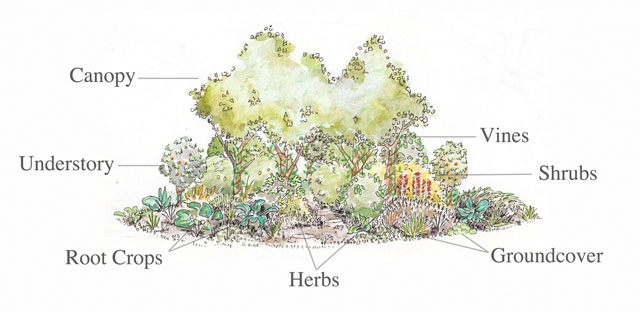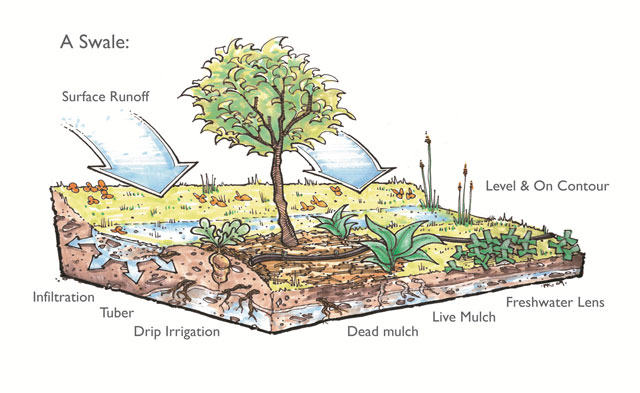
Food Forest Open Source Hub
Intentional earth stewardship by creating an abundant and productive food forest is, in our opinion, essential to comprehensive food sustainability and self-sufficiency. It is also foundational to regenerating our planet and One Community’s Highest Good of All philosophy. For this reason, we are including teaching, demonstrating, and open source sharing food forest creation and development as key components of our open source botanical garden, Highest Good food infrastructure, and model for self-replicating and self-sufficient teacher/demonstration communities, villages, and cities to be built around the world.
As a species we have the ability to truly live in harmony and mutual support with nature. This open source hub (and all the associated pages) will continue to evolve indefinitely as an ongoing demonstration of how to do that through food forest creation. It includes the following sections:
- Specific Plants for Each Food Forest Section
- Other Related Pages
- Ways to Contribute to Evolving This
- What is a Food Forest
- How to Grow a Food Forest
- Creating the One Community Food Forest
- Food Forest Planting and Harvesting Details
- Plant Providers Resource List (where to buy)
- Resources
- Summary
- FAQ
CLICK IMAGES FOR PAGES WITH COMPLETE PLANT LISTS FOR EACH SECTION
OTHER RELATED PAGES (Click icons for complete pages)
CLICK ICONS BELOW TO JOIN US THROUGH SOCIAL MEDIA
WAYS TO CONTRIBUTE TO EVOLVING THIS SUSTAINABILITY COMPONENT WITH US
SUGGESTIONS | CONSULTING | MEMBERSHIP | OTHER OPTIONS
WHAT IS A FOOD FOREST
 A food forest is, as the name implies, a forest of food. The goal of this gardening and land management system is to mimic a woodland ecosystem with companion planting of edible trees, shrubs, perennials and annuals grown in a succession of layers. Fruit and nut trees are usually the canopy/overstory, while below is the understory of berry shrubs and edible ground plantings. Beneficial plants, or “companions,” are included to attract insects for natural pest management, as soil amenders providing nitrogen and mulch, or for other benefits. Working together, the plants form a forest garden ecosystem that functions long-term to increase water retention and infiltration, protect the soils from heavy rainfall events, establish windbreaks, increase soil fertility, expand wildlife habitat, and provide food, building and craft materials, medicines, and more.
A food forest is, as the name implies, a forest of food. The goal of this gardening and land management system is to mimic a woodland ecosystem with companion planting of edible trees, shrubs, perennials and annuals grown in a succession of layers. Fruit and nut trees are usually the canopy/overstory, while below is the understory of berry shrubs and edible ground plantings. Beneficial plants, or “companions,” are included to attract insects for natural pest management, as soil amenders providing nitrogen and mulch, or for other benefits. Working together, the plants form a forest garden ecosystem that functions long-term to increase water retention and infiltration, protect the soils from heavy rainfall events, establish windbreaks, increase soil fertility, expand wildlife habitat, and provide food, building and craft materials, medicines, and more.
Here’s a 7-minute video showing 7 years of growth. Visit this link for more excellent videos by Geoff Lawton:
HOW TO GROW A FOOD FOREST
 Food forests mimic nature, are outstanding examples of earth stewardship, and arguably the most natural and sustainable food production method available. They are low-maintenance, produce a huge diversity of food and habitat, and help to regenerate and then maintain the land they are grown on. Here is a 15 minute video by Robert Hart describing how to create one:
Food forests mimic nature, are outstanding examples of earth stewardship, and arguably the most natural and sustainable food production method available. They are low-maintenance, produce a huge diversity of food and habitat, and help to regenerate and then maintain the land they are grown on. Here is a 15 minute video by Robert Hart describing how to create one:
- CLICK HERE FOR OVER 100 HEIRLOOM SEED SUPPLIERS
- HERE’S A GREAT EDIBLE AGROFORESTRY RESOURCE
- HERE’S AN AMAZING “CREATING A COMMUNITY FOOD FOREST ON PUBLIC LAND” RESOURCE
CREATING THE ONE COMMUNITY FOOD FOREST
Creating the One Community food forest will begin in the first year and continue indefinitely through a process we will share in complete detail here. In addition to building shelter in the form of Pod 1, the Duplicable City Center, and immediate food production with hoop houses and the large-scale gardening strategy, year one will also include soil amendment and establishing the first swales (see the Soil Amendment Page) and phase one of the food forest and other outdoor planting schedule.
The swales will help build the water table, renew the land, and turn our property into a lush and abundant foodscape as we implement an on-going process of “swale-mulch-plant” that moves progressively across the landscape until the entire property has been regenerated. Phase-2 food infrastructure will include indoor food production with the aquapini and walipini structures,
Construction of Pod 1, the Duplicable City Center, walipini/aquapini infrastructure, large-scale gardening strategy etc. will include a zone-development approach to develop maximize beneficial plantings around the associated earthworks for each of these locations. The immediate area surrounding each construction project will be considered a Zone 1 with maximum diversity and more intensive cultivation and inputs. Further out will be progressively Zoned from 2 – 4 with fewer and fewer species, needing less and less inputs and maintenance, and possibly even progressing to the creation of a Zone 5 (true wilderness).
Maximum advantage will be taken of microclimates in order to optimize the number and diversity of species we can grow onsite within the open source botanical garden model. Through the actions of earthworking and planting the site, using good design principles, we will create more favorable microclimates, and are projecting that we may even raise the USDA Zone rating from the current Zone 7a-7b up to a local Zone 8.
PLACEMENT SPECIFICS
Placing individual species in their appropriate locations will need to wait until we are on the property. We are saving this decision process until we are onsite because of the complex matrix of plant needs that must take in the specifics of the different areas of the property for maximum benefit. This includes sun and shade requirements, cold hardiness, soil and drainage preferences, ultimate size of the plant, allelopathic considerations, winter shadows, proximity to buildings or other structures, etc. These things combine to make placement a nearly case-by-case decision. In an effort to maximize the stability, beauty, productivity and self-replication of the ecosystem we create, we will employ (and open source share) as many of these and other design criteria as possible in the development and placement of all plantings at One Community.
FOOD FOREST PLANTING AND HARVESTING DETAILS
Our complete food forest includes a symbiotic cultivation of the following 8 key areas: Canopy, Understory, Vines, Shrubs, Herbs, Groundcover, Root Crops, and Edge Plantings.

Different Components of a Food Forest
 Listed on the pages linked below are descriptions of each of these areas and the plants we will be growing in them in our USDA Zone 7a-7b location (some Zone 8). Where genera are listed, it indicates that more than one species of that genus would be useful. Individual species listings indicate that the species in question has attributes of interest that are unique to the species. Those listing with a (†) indicate that these entries may be marginally adaptable onsite, and should therefore be considered experimental.
Listed on the pages linked below are descriptions of each of these areas and the plants we will be growing in them in our USDA Zone 7a-7b location (some Zone 8). Where genera are listed, it indicates that more than one species of that genus would be useful. Individual species listings indicate that the species in question has attributes of interest that are unique to the species. Those listing with a (†) indicate that these entries may be marginally adaptable onsite, and should therefore be considered experimental.
CLICK IMAGES FOR PAGES WITH COMPLETE PLANT LISTS FOR EACH SECTION
WHERE TO PURCHASE ALL PLANTS
 Here are the results of our research for purchasing all food forest and outdoor plants. Unlike everything we will be growing in the aquapini and walipini structures and large-scale garden, we did not price out each individual plant listed here because we wish to wait for the specific planting plan that will be developed throughout the first year of the living on the property; a planting plan that may evolve this list significantly. We did, however, complete sufficient research so that anyone wishing to purchase any of the plants currently listed above will can do so.
Here are the results of our research for purchasing all food forest and outdoor plants. Unlike everything we will be growing in the aquapini and walipini structures and large-scale garden, we did not price out each individual plant listed here because we wish to wait for the specific planting plan that will be developed throughout the first year of the living on the property; a planting plan that may evolve this list significantly. We did, however, complete sufficient research so that anyone wishing to purchase any of the plants currently listed above will can do so.
We use the following key for all of the plant providers listed below. To jump directly to what you seek, use your browser’s Find Function and remember to put the parenthesis around the letter code for the category you are looking for. Here are the abbreviations with short descriptions of all the categories you will find:
(A) = APPLES
Apples will be an important component of One Community’s Food Forest. We will work to achieve maximum diversity of this important fruit. Any provider listed with an “(A)” is a good source to support anyone interested in growing a diversity of apples.
(B) = BIODIVERISTY
Websites listed with “(B)” are sources of plants that are of interest to our open source Botanical Garden model and the preservation of biodiversity. Look to these sources if you are interested in the preservation of biodiversity too.
(Bb) = BAMBOO
Bamboo has a broad diversity of uses. Any providers listed with a “(Bb)” offer bamboo plants.
(G) = GARLIC
Garlic is food, medicine, flavoring…an essential plant to any community. Mmmm…garlic!
(M) = MEDICINAL
Websites listed with “(M)” are sources of plant with a history of medicinal use.
(O) = ORCHARD
“(O)” providers are website sources of fruits that will be cultivated in mixed polyculture orchards at One Community.
(Tp) = TROPICALS
Providers listed with a “(TP)” provide plants that, in our case, will be limited to the Aquapini/Walapini/Zenapini structures. They may be fruit, medicinal, culinary, etc.
(Tr) – TREES
“(Tr)” providers supply trees for Community forest plantings.
(V) = VEGETABLES
Providers listed with a “(V)” are sites and sources of seeds and plants that will be grown in the community’s food gardens.
(W) = WILD FOODS
Providers listed with a “(W)” are website sources of plant that will be components of Zone 3 and beyond; food plant that do not require much tending or cultivation.
PLANT PROVIDERS
www.sacredsucculents.com (B) (G) (M) (Tr) (V) (W)
Ben Kamm’s collection of useful species includes much more than succulent genera, including California natives, Chilean species, wild food plants, and many little-known or hard to find medicinal plants. Many offerings are available nowhere else. Most have provenance data, describing where they were collected, ecotype, uses, etc. An excellent resource. Limited volume, most propagules are sold out early in the season.
www.centuryfarmorchards.com (A) (O)
Century Farm Orchards is a small commercial nursery dedicated to preserving and disseminating the apple collection of Lee Calhoun, who spent decades locating old apples of the American South. They are the only commercial source for many of these varieties. Not all varieties are propagated for sale every year, so it is advisable to contact them to place orders early. Their web site has excellent descriptions of these apples, their origins, flavors, keeping qualities etc.
www.ars.usda.gov (A) (O)
The National Agricultural Research Service is a department of the USDA. The center at Geneva, New York is associated with Cornell University, and is the repository of the nations collections of apple, grape, and tart cherry varieties. Nearly 7000 apples are maintained here, and are used in breeding programs. Small amounts of dormant budwood are available for many varieties. An important global resource.
www.tropicalfruitforum.com (M) (Tp)
This chat board is one of the best resources for anyone interested in growing tropical or subtropical fruit. Its worldwide membership includes plant breeders, backyard growers, commercial orchardists etc. They have an exchange page where members can buy, sell and trade from their collections. There are many varieties and species held among the membership that are not available from commercial sources.
www.colecionandofrutas.org (M) (Tp)
This is the website of Helton Josue, a Brazilian scientist whose passion for preserving the wild food plants of his region of Brazil has led him to collect and share a wide range of species that are unavailable elsewhere, several are species new to science and have not been formally described. He makes small lots of seed available as they ripen.
www.ecoseeds.com (M) (V) (W)
This is the website of the Redwood City Seed Company, one of the original heirloom seed sellers. Since 1972 Craig and Sue Dremenn have introduced hundreds of valuable varieties of garden vegetables to American gardeners.
www.jlhudsonseeds.net (B) (M) (Tr) (W)
Founded in 1911, J.L. Hudson, Seedsman has for over the last 30 years been operated by David Theodoropolos and Sherri Calkins who are committed to the motto “Preservation through dissemination” Their catalog is always a fascinating read, describing the history, biology, ethnobotany, chemistry etc. for many of the hundreds of species offered. A pioneering company, worthy of support.
www.4everseeds.com (M) (V) (W)
Source of heirloom seeds, wild food seeds, and dye plant seeds. They also market a hand operated oilseed press.
Offers over 600 varieties of heirloom tomatoes.
www.seedsavers.org (M) (V) (W)
Founded in 1975 by Kent Whealy and his family to share some of his own family’s heirloom garden seeds, SSE has grown into the largest grassroots seed preservation organization in the country. Access is by membership. They maintain a demonstration farm in Decorah Iowa and in addition to several thousand varieties of vegetables, they also have a Heritage Orchard of some 400 regional apple varieties, and 360 varieties of grape varieties from the famous grape breeder Elmer Swenson.
www.sandhillpreservation.com (V)
A real family farm, the Sandhill Preservation Center maintains hundreds of vegetable and grain varieties, as well as poultry breeds. They also have an extensive collection of sweet potato varieties and will share their techniques for successfully growing them in colder northern climates.
www.oikostreecrops.com (Tr) (W)
Sells seedlings of many temperate zone food forest species. has a particularly good selection of oaks, both timber and acorn types.
www.lawyernursery.com (M) (Tr) (W)
Wholesale nursery offering tree and shrubs seedlings and bulk seed of many common species to forestry projects and revegetation projects. Also fruit tree rootstocks in bulk and at good prices.
www.ediblelandscaping.com (M) (O) (Tr) (V) (W)
Good varietal selection of many standard and unusual food perennials.
www.bonitafruittrees.com (O) (Tp)
Extensive collection of subtropical and deciduous fruit trees.
www.rollingrivernursery.com (O) (Tr)
Fruit and nut tree nursery.
Main producer of avocado, citrus and subtropical fruit trees for commercial California groves.
Source of many rare tropical fruit tree species. Based in Hawaii but ships in bulk to Excalibur Nursery in Florida.
www.dnagardens.com (V) (W)
Canadian nursery that is the licensed propagator for the new “Ben” series of black currants.
Canadian vegetable seed supplier.
Nursery specializing in the production of trees inoculated with the endomycorrhizal fungi producing black and white truffles. The mycelia web in forest ecosystems is an important design element in evolving a food forest, as many tree species are benefitted by mycorrhizal association with certain fungal symbionts.
www.filareefarm.com (G) (V)
Seed garlic and potatoes.
www.hoodrivergarlic.com & www.thegarlicstore.com & www.greenmountaingarlic.com (G)
Seed garlic providers.
www.garlicfarm.ca & www.rasacreekfarm.com & www.snoetic.ca (G)
Canadian source of seed garlic.
www.richters.com (M) (V)
Canadian company offering medicinal plants and culinary herbs, either live plants or seeds. An excellent resource for the herb garden.
www.companionplants.com (M) (W)
Herbs, medicinals, culinary and dye plants and seeds.
www.yerbabuenanursery.com (B) (M) (W)
A significant percent of California native plants were used medicinally and this provider specializes in them and supplies information on traditional medicinal usage.
Nursery supplying ginseng rootlets for planting as well as bloodroot.
www.rareplantnursery.net (M) (V)
Herb and garden plant nursery. A few vegetable and fruit plants as well.
www.healingspiritplants.com (M)
California-based collection of medicinal plants. They list many rare species not widely available.
Florida-based nursery offering many uncommon subtropical herbs.
www.plantdelights.com (M) (W)
Texas nursery offering a wide variety of unusual plants including medicinal, food, bee pasture etc.
www.arneherbs.co.uk (M) (W)
UK source for over 900 herbs and wildflowers. Unknown if they ship outside the UK.
Massachusetts nursery dedicated to the reservation of at-risk medicinal plants.
Oregon nursery with a range of culinary and medicinal herbs.
www.mountaingardensherbs.com (M) (W)
Herbalists that offer workshops in Chinese herb cultivation, harvesting, processing and use. Grow a wide range of TCM herbs offered as seed and plants. Have a number of herbs unavailable elsewhere in North America.Also offers wild food plant of both the eastern U.S and a collection od ‘sansai’ – traditional wild mountain vegetables of Japan.
www.blackfootnativeplants.com (M) (W)
Montana nursery specializing in plants native to the bioregion including wild food and medicinal species.
www.silverhillseeds.co.za (B) (M) (W)
Seed company in South Africa offering a wide range of S.A natives including wild food and medicinal species. Seed is mainly collected from wild stands. Valuable source of some species unavailable outside Africa.
www.hawaiiantropicalplants.com (M) (Tp)
This Hawaiian nursery has some rare tropical medicinals, including yoco and cultivars of kava.
www.treefrogfarm.com (M) (W)
Pacific Northwest natives nursery including medicinal and wild food species.
www.horizonherbs.com (M) (W)
Since 1985 Richo Cech and his family have been collection growing and using plants on their Oregon farm. They offer a wide range of vegetable, culinary and medicinal seeds, roots and tubers.
www.heritageflowerfarm.com (B) (M)
Wide range of perennials, some with medicinal properties although this may not be noted on the website.
www.forestfarm.com (M) (Tr) (W)
Large wholesale nursery of tree shrub and fruit tree stock.
www.rareplantresearch.com (B) (M) (W)
Offering a selection of mostly tender arid-zone species with a particularly good collection of Burseraceae.
www.richardlyonsnursery.com (Tp)
Nursery offering mainly subtropical and tropical trees and shrubs including some rarities.
www.msknursery.com (B) (M) (Tr) (W)
Wide selection of trees shrubs and perennial including some rarities.
www.nolinnursery.com (O) (Tr)
Nut trees, persimmons, and pawpaws.
www.wagonwheelorchard.com (A) (O)
Offering over 1,000 apple varieties as benchgrafts.
www.justfruitsandexotics.com (O) (W)
Good varietal selection of many unusual fruits.
www.kuffelcreek.com (A) (O)
California nursery offering low-chill apple varieties for mild winter climates.
www.sunscapes.net (B) (M) (W)
Colorado nursery offering mostly drought tolerant perennials.
Baker Creek Seeds is an heirloom vegetable seed company offering a wide range of varieties.
California heirloom seed company offering organic seed for over 1600 varieties of vegetable,grain, herb and cover crop seed.
Heirloom vegetable, herb, grain seeds.
www.seedsofchange.com (M) (V)
Offering vegetable, herb and flower seed.
Maine company offering short-season and greenhouse adapted vegetable seed and berry plants. www.kitazawaseed.com (V)
Seed company offering a wide range of Asian vegetables, especially leafy greens. Lists species that are difficult to find elsewhere; pickling melon, water pepper, perilla, water dropwort, etc.
www.vermontbean.com (V) (G)
Seed company offering heirloom and open-pollinated vegetable seed, garlic and berry plants.
www.noursefarms.com (V) (O)
Since 1932, Nourse farms has been a supplier of cane berry, strawberry, rhubarb and asparagus plants.
www.agroforestry.co.uk (M) (W)
UK based company offering an extensive range of edible and medicinal temperate trees shrubs and perennials.
www.badgersett.com (Tr) (W)
Conservation Seeding and Restoration Inc. is a seed company and nursery offering seed mixes and native plant revegetation services for the mountain west. Their species list includes wild food plants and medicinal species.
www.permaculturenursery.com (M) (W)
Offering some unusual edible perennials, including Phaseolus polystachyos, a perennial bean species.
www.onegreenworld.com (M) (O) (W)
Wide selection of edible species for temperate climates.
Gary Nabham’s pioneering organization dedicated to preserving the food plants of Native American cultures in the Sonoran Desert region.
Fruit tree nursery specializing in heirloom fruit varieties.
www.tierramadrefarm.com (A) (O)
Fruit tree nursery with a focus on the heritage apples of Virginia. Many unique varieties.
www.arboreumco.com (A) (O)
California nursery offering many rare and heirloom fruit varieties. One of the only sources of improved cultivars of tecojote (Crataegus mexicana).
Located in Puerto Rico, Montoso Gardens supplies many rare tropical fruit trees and seeds from their collection.
www.organicfarm.net (Tp)
Also in Puerto Rico, Sadhu Govardhan has an extensive collection of tropical fruit and food trees. He sell seeds and plants.
One of the largest collection of banana varieties available for sale. Rooted corms or tissue culture.
www.floridahillnursery.com (M) (Tp)
Located in Orlando Florida, they have an extensive collection of banana and pineapple varieties reproduced via tissue culture. Also other tropical ornamentals and gingers.
www.excaliburfruittrees.com (Tp)
Florida nursery offering a wide selection of tropical and subtropical fruiting plants. Has a good selection of jackfruit varieties.
www.desertsurvivors.org (M) (W)
Southern Arizona native plant nursery. Lists some rare desert edible and medicinal species.
Medicinal herb nursery.
www.australianplants.com (Bb) (W)
Located in Southern California, they offer a range of hard-to-find Australian and South African species for xeriscaping and mediterranean gardens.
www.bamboogarden.com (Bb) (W)
Oregon nursery specializing in bamboo.
www.bamboodirect.com (Bb) (W)
Oregon nursery specializing in bamboo.
www.bamboosourcery.com (Bb) (W)
California nursery specializing in bamboo.
www.walkeravenuenursery.com (Bb) (M) (W)
California nursery specializing in aquatic and bog plants including many edible and medicinal species.
www.raintreenursery.com (Bb) (M) (Tr) (V)
Located in Morton Washington, they offer fruit trees, nut trees, berries, vines, citrus, subtropicals, rootstocks, mushrooms and ornamentals.
www.burntridgenursery.com (Bb) (Tr)
Located in the foothills of the Cascade mountains. Specialize in unusual and disease resistant trees, vines, and shrubs that produce edible nuts or fruits. Has Northwest native plants and ornamental and useful landscape trees.
RESOURCES
- Permies.com Seed and Plant Source Review Grid
- Permaculture Research Institute Article: “Why Food Forests”
- Article: Creating a Food Forest ” Step-by-Step Guide
- Book: Beyond the War on Invasive Species: A Permaculture Approach to Ecosystem Restoration
- Book: The New Wild: Why Invasive Species Will Be Nature’s Salvation
- Have something you think should be added here? Click HERE to tell us about it
SUMMARY
 Through applied permaculture principles and proper stewardship it is possible to turn almost any piece of land into an abundant and thriving forest of food. As part of One Community’s Highest Good of All philosophy, and open source botanical garden model, we will be open source sharing our afforestation/reforestation experience as we create our food forest on the One Community property. This process will continue indefinitely and we will keep on-going records of this transformation through detailed notes and time-lapse videos (covering years of development) that we will add to this page as they are completed.
Through applied permaculture principles and proper stewardship it is possible to turn almost any piece of land into an abundant and thriving forest of food. As part of One Community’s Highest Good of All philosophy, and open source botanical garden model, we will be open source sharing our afforestation/reforestation experience as we create our food forest on the One Community property. This process will continue indefinitely and we will keep on-going records of this transformation through detailed notes and time-lapse videos (covering years of development) that we will add to this page as they are completed.
FREQUENTLY ASKED QUESTIONS
Q: How do you intend to evolve this page?
Part of One Community’s Highest Good of All philosophy is open source sharing the complete details of what is possible with a food forest. Through our open source botanical garden model we will accession all plants on the property and entering the property and then keep detailed records of:
- Planting guidelines for each plant
- Cultural considerations for each plant
- Which plants do best in each of the different zones
- Harvest numbers and details on how to improve harvest volume
- The visual transformation of the property using carefully planned and maintained time-lapse photography
All of these details will be added and updated on this page indefinitely along with answers to questions raised by visitors to the property and this site.
Q: What if I have a suggestion for that I feel would be valuable to add to this page?
Please submit it to us using our Suggestions Page. There are also always positions open to join our team as either a Consultant or Pioneer.
Q: Why are all the names listed in latin?
Latin names are used first because they are universally accepted with common names following in parenthesis.
WHO WE ARE
MAIN OPEN SOURCE HUBS
KEY FOOD COMPONENTS
- OS Hub
- Grow
- Build
- Ethical, Humane, & Conscientious Goat Stewardship
- Ethical, Humane, & Conscientious Rabbit Stewardship
- Ethical, Humane, & Conscientious Chicken Stewardship
- Food Forest
- Hoop Houses
- Apiary/Bee Yard
- Botanical Garden Creation & Inventorying
- Conscientious Wildlife Stewardship and Habitat Development
- Large-scale Gardening
- Soil Amendment & Site Preparation
 One Community
One Community















